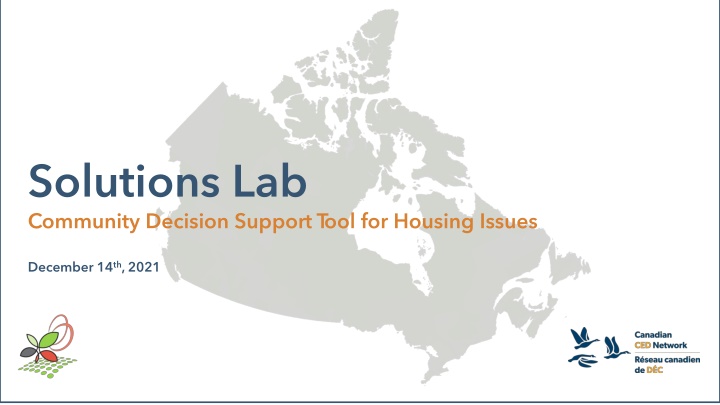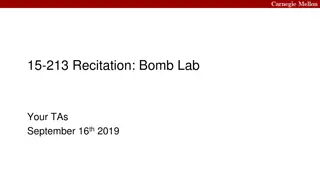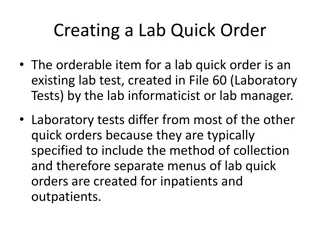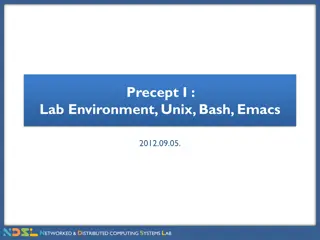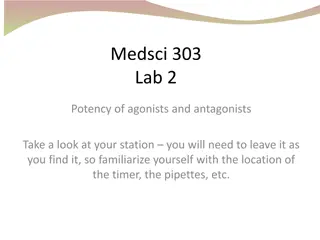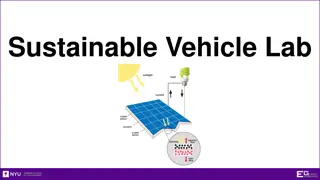Solutions Lab
This innovative Decision Support Tool offers solutions for addressing housing issues within communities. Designed to streamline decision-making processes, it provides valuable insights and recommendations to help tackle housing challenges effectively. Stay informed and empowered with this comprehensive tool.
Download Presentation

Please find below an Image/Link to download the presentation.
The content on the website is provided AS IS for your information and personal use only. It may not be sold, licensed, or shared on other websites without obtaining consent from the author.If you encounter any issues during the download, it is possible that the publisher has removed the file from their server.
You are allowed to download the files provided on this website for personal or commercial use, subject to the condition that they are used lawfully. All files are the property of their respective owners.
The content on the website is provided AS IS for your information and personal use only. It may not be sold, licensed, or shared on other websites without obtaining consent from the author.
E N D
Presentation Transcript
Solutions Lab Community Decision Support Tool for Housing Issues December 14th, 2021
Agenda 1. Vision for prototype 2. Moving forward with what we heard 3. Phase 5 and beyond
Solutions Lab Timeline National Level Ideation Session Prototyping activities workshop Draft prototype: Presentation SL Phase 1 kick-off End of project 2 Mar. 2021 15 June 2021 16 Nov. 2021 2 Mar. 2022 1 Oct. 2020 22 Apr. 2021 14 Sep. 2021 14 Dec. 2021 31 Mar. 2022 National session to share ideas from local micro-labs Developmental Prototype: V.1 Suite of Tools Lessons Learned Roundtable / Road map engagement session National Insight Generation Workshop
Prototype: Community Decision Support Tool for Housing Issues Vision: The Community Decision Support Tool for Housing Issues will offer credible and accessible data for local housing practitioners located anywhere in Canada. The suite of tools will provide evidence-based answers to questions being asked locally across Canada. Data accessed via the suite of tools will serve as one of many inputs to evidence-based housing-related local decision making.
Solutions Lab Successes to Date 1. Renewed and deepened focus on housing and homelessness as a priority theme 2. Capacity to structure large and diverse data sets based on common questions being asked at the community level across the country 3. New Partnerships emerging with CMHC, Canadian Alliance to End Homelessness, Centre for Rural Economic Development 4. Connecting with emerging best practices through other Solutions Labs and Housing Supply Challenge projects
CDPs Role in the Data Supply Chain: CDP as value-added wholesaler Surveys & Admin Data: Statistics Canada Private providers CMHC IRCC ESDC Accessible Data Warehouse: Focus on access to data Custom tables at small geos Data choice Tableau as data access tool Technical support Localized products & tools Housing Needs Assessment Tool Rental Affordability Index Housing Investment tool Data Creators Data Retail Designed by universities & consultants and/or contracted by local organisations Data Wholesale Data acquired by CDP CDP data products are inputs to data retail products Data Consumers Each member organisation s needs are unique CDP members possess varying data analysis capacities Member organisations draw from CDP and other data sources, including in-house data Members may work directly with data creators and data retailers
Housing and Homelessness Data: CDPs Approach Benefits to the warehouse model: - One stop shop: All your data needs under one roof - no need to visit multiple sources to find what you re looking for Census TGP New Construction Survey - Versatility: Data products are available in a variety of formats, so there is something for everyone Pop. Core- Housing Need Estimates CMHC Rental Survey - Relationships: CDP team is in direct contact with data wholesalers so will strive to order products that align with needs of housing practitioners 2021 Census Products Building Permits - Member services: CDP team available to help members locate and transform data into compelling retail products
Prototype Development 4 key Building Blocks 1 Resources to support analysis 3 Data Advocacy Community Decision Support Tool for Housing Issues 2 Data Access & Visualization 4 Engagement & Outreach Business Model
What we heard during Phase 4 (high-level) - Wheelhouse Model is an appropriate framework for organizing data, but since it s a model, there are some limitations - Practitioners want access to both Tableau products as well as original data table - Data for small area geographies is very important - Practitioners across the country have many of the same questions related to housing and homelessness - Local data and external housing and homelessness datasets can compliment the working being done in the Solutions Lab
Accessing the Housing & Homelessness Portal Moving forward based on Phase 4 engagement: - Solutions Lab Portal to be renamed Housing and Homelessness Portal - Access point for all housing and homelessness related data and resources https://communitydata.ca/content/solutions-lab-community-decision-making-tools-housing-issues
Data-related tools for data users Moving forward based on Phase 4 engagement: - Access to a range of tools that support data analysis i.e. access to Tableau products, IVT tables, excel tables - A platform for sharing best practices from other Canadian jurisdictions - E.g. UBC Hsg Supply Challenge - Housing Needs Assessment Tool; BCNPH Rent Index - Updates on webinars and community data news - Technical support videos, past webinars, guides
Wheelhouse Model for Organizing Data Moving forward based on Phase 4 engagement: Safety Net Housing - Wheelhouse model used as framework for organizing data Short-T erm Supportive Housing Emergency Shelters - Housing with supports renamed non- market housing Long-Term Supportive Housing Ownership Housing - Wheelhouse model will include tab describing limitations of model for organizing data Non-Market Rental Housing Market Rental Housing Source: https://www.cmhc-schl.gc.ca/en/blog/2019-housing-observer/wheelhouse-new-way-looking-housing-needs
What We Heard: Priority Data Sets Moving forward based on Phase 4 engagement: Disaggregating housing demand data by CMHC priority demographic groups Data for small area geographies Intercensal data Building a full picture of the local rental universe Filling data gaps using data modelling and administrative data collection
Storyboard Data Visualization Moving forward based on Phase 4 engagement: Housing and homelessness data to be made available in the form of a Tableau dashboard modelled after Community Recovery Dashboard CDP will explore options for developing access tools for both PowerBi users and Tableau users Dashboard Data will also be available through a data access dashboard and in its original format
Engagement & Outreach Moving forward based on Phase 4 engagement: - Focused on widening the Program s reach to housing practitioners across Canada: - A cross-Canada Homelessness Community Data Network is under development in partnership with the Canadian Alliance to End Homelessness, proposal submitted to ESDC - Infrastructure Canada s Centre for Rural Economic Development (CENRED) has agreed in principle to sponsor a Rural Community Data Network - CDP will be marketing its program to prospective municipalities in anticipation of the release of the 2021 Census
Data Advocacy Moving forward based on Phase 4 engagement: Advocacy efforts are focused on filling data gaps Enabling access to new STC Housing Statistics Program Working directly with CMHC to overcome limitations of CMHC data portal Serving as a voice of CDP members regarding data issues Statistics Canada being engaged via quarterly meetings as a bilateral forum for identifying data acquisition priorities CMHC being engaged via a bilateral partnership agreement to develop customized data CDP to regularly update members on new data
Business Model Moving forward based on Phase 4 engagement: Implementing the prototype and sustaining its development will rely on a three-part business model: 1. Core revenue stream will continue to be based on the membership-based Community Data Consortium 2. Project-based grant funding will enable further development of the prototype 3. An expanded fee-for service Community Analytics could be designed to recover costs of investment in refining data visualizations
Phase 5 and Post-Project Phase 5 - January 1st March 31st, 2022 - Dissemination of user survey - Completion of Solutions Lab Roadmap - Final report to CMHC to be submitted - Develop a Demo version of Housing and Homelessness Dashboard & Storyboard in Tableau - Roundtable Event: March 2nd 1:30 - 3:00 pm ET - Final Solutions Lab session: March 8th -1:30 3:00 pm ET Post-April 1st, 2022 - CDP committed to developing Housing and Homelessness Dashboard as part of 2022 program budget - Housing and Homelessness Data Portal to be launched (with support of ESDC, funding pending)
Access to Project Resources & Data Moving forward beyond March 31, 2022 - Materials developed during the Solutions Lab project will be made available to CDP members and non-members - Data products developed after post-Solutions Lab project will be available to members only - Non-member organizations are encouraged to become members of an existing consortium or to establish a new consortium
